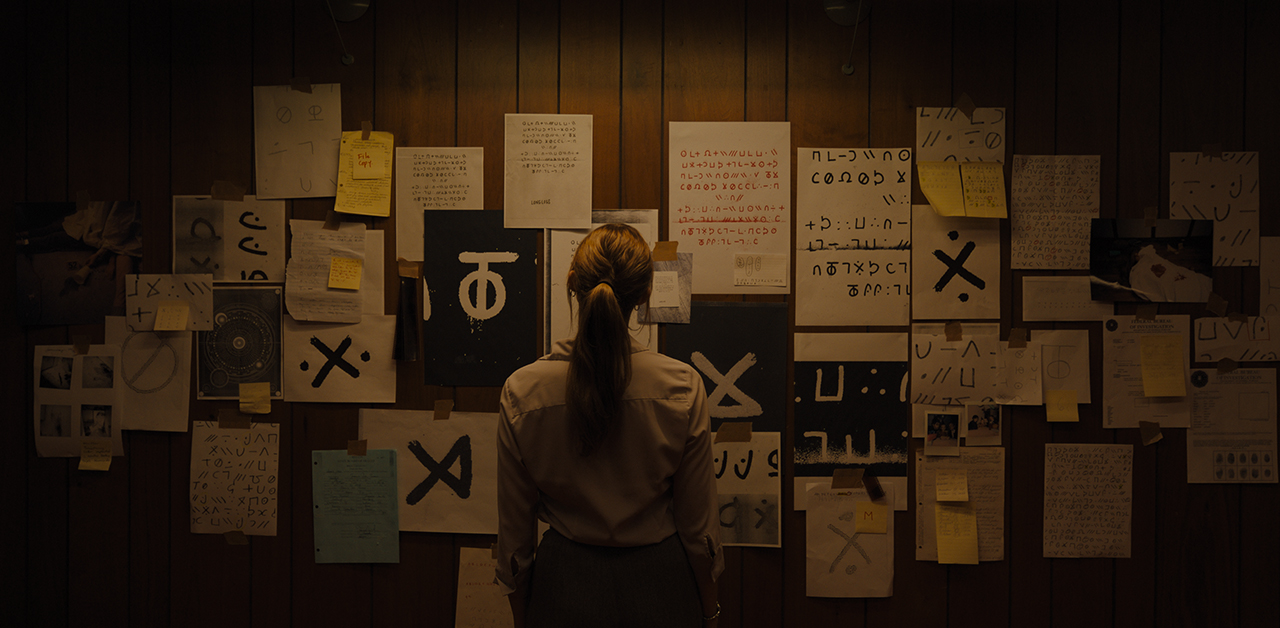Maika Monroe Interview: The Star Of ‘Longlegs’ Is On the Case [July Cover Story]

A decade ago, before A24 and NEON were regularly producing prestige indie horrors, Maika Monroe helped permanently change the landscape of heightened chillers with her haunting breakout performance in It Follows. Now, with the imminent theatrical release of Osgood Perkin’s occult crime shocker Longlegs, Monroe continues her domination of dark arthouse cinema with this new terrifying future classic.
Monroe’s turn as FBI agent Lee Harker in Longlegs is arguably the most impressive transformation of her career yet. Small and quiet, yet with the impossible gravity of a dime-sized black hole, Monroe disappears into the role of a gifted yet reclusive agent on the hunt for a brutal serial killer, the film’s title antagonist, played by Nicolas Cage.
Monroe grimaces when asked how she might describe Agent Lee Harker to a group of friends. “Socially awkward would be the first words I’d use,” she tells me, maybe a bit embarrassed, as if she were talking about herself. “And a bit quiet,” she continues.
“When you see her in social settings, she’s very uncomfortable. But then, when you see her talking about this case, or when she’s piecing things together, that’s where she comes to life. And it was so fun playing with those levels … I feel like she’d listen to a lot of opera,” she tells me when asked what sort of music her character might listen to.
“So, serial killer music?” I ask. “Exactly,” she replies earnestly.
One of the wildest elements of Longlegs is how well its classic rock soundtrack juxtaposes its bleak, Northern Gothic setting and atmosphere. This ironic music choice makes the movie all the more unsettling, with some critics even referring to it as “rock and roll” horror. Music was also an essential part of Monroe’s creative process, and director Osgood Perkins used it to help the star tap into his striking and complex world.
“He made a playlist prior to filming, which had a lot of T-Rex on it, and older rock music,” she says, reminding me of the innovative use of the 1970s band T-Rex in the film and its soundtrack.
Monore added, “It’s amazing. This sort of genre paired with that music was so brilliant. Music is so important to me as an actor. It’s something that I’ve always used since the first movie sets I’ve been on. There’s just so much happening on a set. There are so many people and things … that it’s just such a great way for me to focus and tap into certain emotional places that I need to get to. It’s something I use all the time.”
When it came to Monroe’s personal music curation for getting into the zone on Longlegs, there was one surprising song that she kept coming back to.
“It might sound random, but it’s ‘Fast Car’ by Tracy Chapman,” she tells me. “I think it feels like this mother and daughter. I connected that to thinking of my mom, and it just made me emotional. That was a song that I loved listening to on this set when I needed to go to a certain place.”
While music is an important tool for helping her tap into a role, like with any seasoned FBI agent, Monroe has practice leaving the more disturbing elements of her job in the office before heading home.

“In the beginning, it was a lot harder for me,” she says of her growing capacity to avoid taking heavy work home after the cameras stop rolling.
“I was just not as mentally equipped as I am now to handle it. It’s tough. Sometimes you’re spending 12 to 14-hour days in a very dark mental space. A lot of times there are days where you have to get super emotional or get to very high-intensity fear, and your body has to go through that mentally and physically. But I’ve figured out ways to help decompress at the end of the day, for sure. It’s important. You’ve got to.”
Without giving too much away, Agent Harker is an especially gifted FBI agent, in more ways than one. It’s an aspect of the role that’s not too far outside Monroe’s comfort zone. When asked if she believes in psychics and the supernatural, her answer is yes.
“I went to one once, I’m honestly surprised that I haven’t gone more. I feel like it’s kind of a fun thing to do. I went with one of my best friends, and still to this day, I remember this person saying something along the lines of … ‘you almost died,’ or that some sort of incident was almost supposed to happen to me, but that I was still meant to be here for some reason. I was like, ‘I’ll take it.'”
“I definitely believe in ghosts,” Monore says confidently as we begin to discuss other types of supernatural phonenoma. So I asked her if she’s ever experienced something she couldn’t explain.
“In the previous house I lived in, I would wake up in the middle of the night and hear … clear as day … these footsteps. It sounds terrifying now, but you can trust me, it didn’t feel scary. My mom heard them too.”
Unlike the benevolence of Monroe’s ghostly roommate, the unexplainable horrors in Longlegs are, in fact, very scary. What is it about this movie that is scaring both audiences and critics so much? According to its star, a lot of it comes down to style, photography, and pacing.
“Os [director Osgood Perkins] and our DP Andrés Arochi did such great work with the camera,” she tells me, punctuating the importance of the two visionaries.
“It adds to this intensity and airiness that you don’t always see. Nothing can be happening in a scene, yet you feel uncomfortable just because of how they shot it, which is incredible. It’s all very dark and bleak and the aesthetic of it, of all the locations that we filmed, it all really aided that. It was freezing, which is very different for me and my upbringing growing up in California, so there was an unsettling feeling, maybe always and kind of discomfort. We still had so much fun.”

As a horror fan, I found that Longlegs scratches a morbid itch that I tend to soothe with true crime documentaries and podcasts. I think it’s partly due to the film’s unflinching, unforgiving brutality that helps make it so satisfying and appealing to fans.
When I ask Monroe why she thinks audiences are so drawn to true crime content, her ears perk up immediately.
“I don’t know, because I love it too!” she says excitedly, and for some reason, I’m not surprised. “I love watching crime docs. I love crime shows, and it’s all really fucked up,” she continues with a smile.
“It makes me a bit worried for us, for humanity,” she says after reflecting for a quick moment. “I do often wonder why we are all so obsessed with it. I don’t know, but those real experiences are hopefully foreign to most people. So there’s maybe this … intrigue with the unknown.”
It’s a bit off-topic, but before we wrap up, I have no choice but to ask Monroe if she’s aware of how badly horror fans wish the seashell e-reader from It Follows existed in real life. The iconic device seen in the movie has haunted fans, myself included, for nearly a decade. With Longlegs studio NEON now crafting a long-awaited sequel to the cult classic this year, this could finally be our time.
“I’m hoping that we can bring a slightly more advanced shell phone to the sequel,” Monroe tells me with a knowing smirk.
“Maybe I’ll talk to David about that. Right. Maybe it can be something a little more upgraded. NEON really is at the forefront of marketing and campaigning films. I think what they’ve done with Longlegs has been absolutely brilliant. So I have really high hopes. And you know what? I’ll have a little chat with them about that.”
Longlegs starring Maika Monroe is in theaters from NEON and director Osgood Perkins on July 12, 2024.
Categorized: Cover Stories Interviews News
